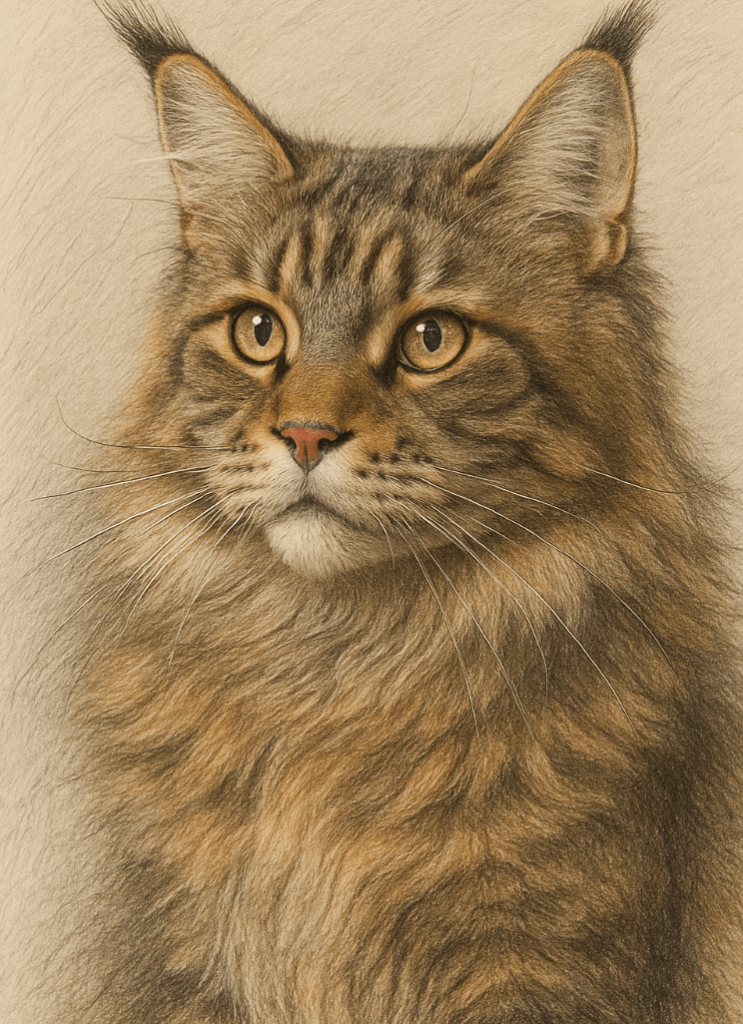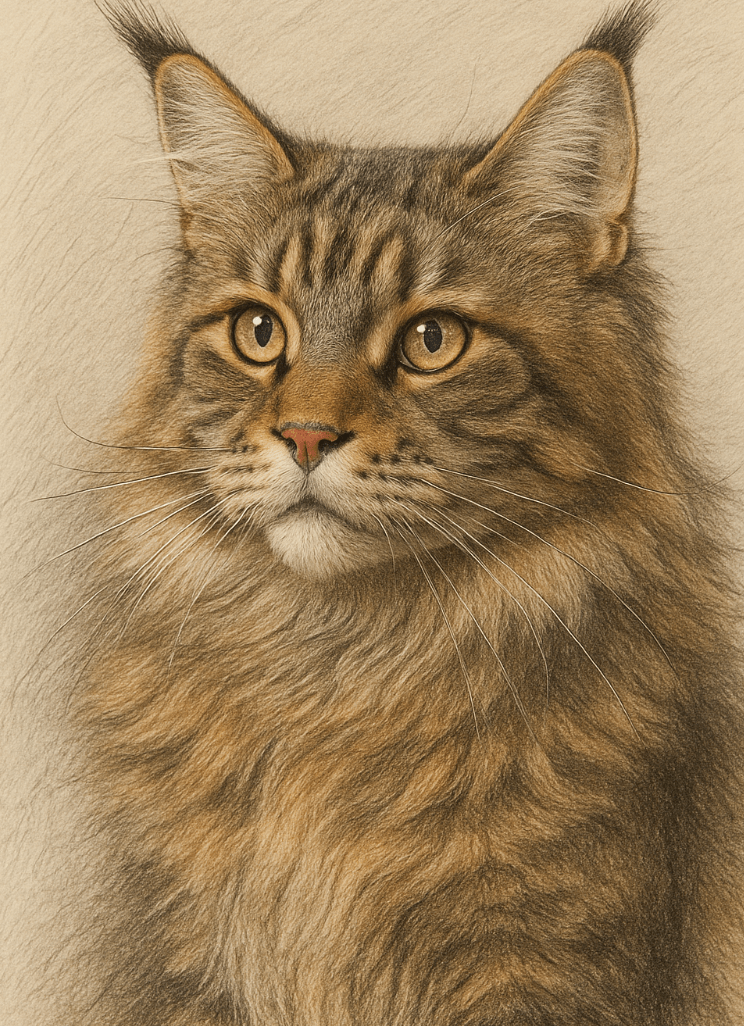How Much Does a Maine Coon Cat Weigh?
The Maine Coon cat, often referred to as the “gentle giant” of the feline world, is renowned for its impressive size and majestic appearance. One of the most common questions about this beloved breed is, “How much does a Maine Coon cat weigh?” Understanding their weight range is essential for ensuring their health, happiness, and proper care. From genetics to lifestyle factors, several elements influence how much your Maine Coon might weigh.
In this blog post, we’ll delve into everything you need to know about their weight, including average ranges, factors that affect it, and tips for maintaining a healthy weight. Whether you’re a proud Maine Coon owner or simply curious about this magnificent breed, this guide will provide valuable insights.
Average Weight Range of Maine Coon Cats
Maine Coons are one of the largest domesticated cat breeds, and their weight can vary significantly depending on gender, age, and genetics. Here’s a breakdown of what you can expect in terms of their average weight.
Male Maine Coons:
Male Maine Coons typically weigh between 13-18 pounds (6-8 kg), though some exceptionally large males may reach up to 25 pounds (11 kg).Female Maine Coons:
Female Maine Coons are generally smaller, weighing between 8-12 pounds (3.5-5.5 kg), with rare cases reaching slightly higher weights.Kitten Growth Rates:
Maine Coon kittens grow steadily over several years, reaching their full size by around 3-5 years old. Their weight increases gradually during this period.Regional Variations:
Genetics and breeding standards in different regions may influence the average weight of Maine Coons, with some bloodlines being larger than others.Healthy Weight Range:
A healthy Maine Coon should maintain a weight within these ranges, avoiding obesity or underweight conditions through proper diet and exercise.
Understanding these averages helps you monitor your cat’s growth and ensure they remain within a healthy weight range.
Factors That Influence a Maine Coon’s Weight
Several factors contribute to a Maine Coon’s weight, from genetics to environmental influences. Recognizing these variables can help you better manage your cat’s health and well-being.
Genetics and Bloodline:
The size and weight of a Maine Coon are heavily influenced by their genetic background and the traits passed down from their parents.Diet and Nutrition:
A balanced diet rich in protein and essential nutrients supports healthy growth and prevents excessive weight gain or loss.Activity Level:
Active cats who engage in regular play and exercise tend to maintain a healthier weight compared to sedentary ones.Age and Life Stage:
Kittens, adults, and senior cats have different nutritional needs, which directly impact their weight over time.Health Conditions:
Certain medical issues, such as hyperthyroidism or diabetes, can cause fluctuations in weight that require veterinary attention.
By addressing these factors, you can ensure your Maine Coon stays at an optimal weight throughout their life.
Check this guide 👉Where Do Maine Coon Cats Come From? Best 7 Expert Tips!
Check this guide 👉Polydactyl Maine Coon: Best 7 Expert Tips!
Check this guide 👉How High Can a Maine Coon Jump? Best 7 Expert Tips!

Factors That Increase Weight | Factors That Decrease Weight |
|---|---|
Overfeeding or high-calorie diets | Insufficient food intake or poor diet |
Lack of physical activity | Excessive exercise or stress |
Genetic predisposition to larger size | Underlying health conditions |
Age-related slowing of metabolism | Rapid growth spurts in kittens |
Neutering/spaying affecting hormones | Dental issues impacting eating habits |
Tips for Maintaining a Healthy Weight in Maine Coon Cats
Keeping your Maine Coon at a healthy weight is crucial for their longevity and overall quality of life. These practical tips can help you achieve that goal.
Provide a Balanced Diet:
Feed your cat high-quality food specifically formulated for large breeds, ensuring they receive the nutrients they need.Monitor Portion Sizes:
Avoid overfeeding by measuring portions according to your cat’s age, weight, and activity level.Encourage Regular Exercise:
Engage your Maine Coon in interactive play sessions using toys like feather wands or laser pointers to keep them active.Schedule Routine Vet Check-Ups:
Regular veterinary visits allow you to track your cat’s weight and address any potential health concerns early.Avoid Free Feeding:
Instead of leaving food out all day, establish set meal times to regulate calorie intake and prevent overeating.
With consistent effort, these strategies will help your Maine Coon maintain a healthy and stable weight.
Signs Your Maine Coon Is Overweight or Underweight
Recognizing when your Maine Coon is outside their ideal weight range is vital for addressing potential health issues promptly. Look out for these signs.
Overweight Signs:
Difficulty grooming themselves or visible rolls of fat around the abdomen indicate excess weight.Underweight Signs:
Prominent ribs, spine, or hip bones without a layer of fat suggest your cat may be underweight.Lethargy or Reduced Mobility:
Overweight cats may struggle to jump or move easily, while underweight cats may appear weak or tired.Changes in Appetite or Behavior:
Sudden changes in eating habits could signal underlying issues affecting weight.Coat Condition:
Poor coat quality or excessive shedding may accompany unhealthy weight fluctuations.
Identifying these signs early allows you to take corrective action and ensure your cat’s well-being.
Common Mistakes to Avoid When Managing Maine Coon Weight
Even experienced cat owners can make mistakes when it comes to managing their Maine Coon’s weight. Avoiding these pitfalls ensures your cat stays healthy and happy.
Overfeeding Treats:
Too many treats can lead to unnecessary calorie intake, contributing to weight gain over time.Ignoring Portion Control:
Feeding too much food at once can overwhelm your cat’s digestive system and lead to obesity.Neglecting Regular Exercise:
Failing to provide adequate playtime can result in a sedentary lifestyle and unhealthy weight gain.Skipping Vet Visits:
Delaying routine check-ups may mean missing early warning signs of weight-related health issues.Assuming All Large Cats Are Healthy:
Just because Maine Coons are naturally large doesn’t mean they can’t become overweight or obese.
Avoiding these mistakes sets the foundation for responsible pet ownership.
Health Risks Associated with Unhealthy Weight in Maine Coons
Both overweight and underweight conditions pose risks to your Maine Coon’s health. Being aware of these dangers underscores the importance of maintaining a healthy weight.
Obesity-Related Issues:
Excess weight can lead to joint problems, diabetes, and heart disease in Maine Coons.Malnutrition Risks:
Underweight cats may suffer from weakened immune systems, lethargy, and organ dysfunction.Decreased Lifespan:
Unhealthy weight fluctuations can shorten your cat’s lifespan, reducing their quality of life.Difficulty Grooming:
Overweight cats may struggle to clean themselves, leading to skin infections or matting.Increased Veterinary Costs:
Addressing weight-related health issues can be costly and emotionally taxing for owners.
Preventing these risks ensures your Maine Coon lives a long, happy, and healthy life.
Fun Ways to Keep Your Maine Coon Active and Fit
Encouraging your Maine Coon to stay active is not only beneficial for their weight but also strengthens your bond with them. These fun activities will keep them entertained and engaged.
Interactive Toys:
Toys like feather wands, laser pointers, and puzzle feeders stimulate hunting instincts and encourage movement.Climbing Structures:
Invest in a sturdy cat tree or shelves to let your Maine Coon climb and explore vertically.Hide-and-Seek Games:
Hide treats or toys around the house to pique their curiosity and get them moving.Scheduled Play Sessions:
Dedicate 15-20 minutes daily to structured playtime, ensuring they burn off excess energy.Leash Training:
Some Maine Coons enjoy outdoor adventures on a leash, providing fresh air and exercise safely.
Incorporating these activities into your routine ensures your Maine Coon stays fit and mentally stimulated.
Frequently Asked Questions About Maine Coon Weight
What is the average weight of a male Maine Coon?
Male Maine Coons typically weigh between 13-18 pounds (6-8 kg), with some outliers reaching up to 25 pounds (11 kg).
Do female Maine Coons weigh less than males?
Yes, females usually weigh 8-12 pounds (3.5-5.5 kg), making them noticeably smaller than males.
When do Maine Coons stop growing?
Maine Coons reach their full size and weight by around 3-5 years of age.
Can neutering/spaying affect my Maine Coon’s weight?
Yes, these procedures can slow metabolism, potentially leading to weight gain if diet and exercise aren’t adjusted.
How can I tell if my Maine Coon is overweight?
Look for signs like difficulty grooming, visible fat rolls, or reduced mobility, and consult your vet for confirmation.
Ensuring a Happy and Healthy Maine Coon Through Proper Weight Management
The Maine Coon’s impressive size and weight make them truly unique among domestic cats, but maintaining a healthy weight is key to their long-term health and happiness. By understanding their average weight range, recognizing influencing factors, and implementing effective care strategies, you can ensure your feline friend thrives. Remember, every Maine Coon is an individual, so tailor your approach to suit their specific needs. With love, attention, and proactive care, your gentle giant will enjoy a fulfilling life as a cherished member of your family.
Dog Tapeworm Life Cycle: Best 7 Expert Tips! – Learn how tapeworms infect dogs, spot symptoms, and break the cycle with expert prevention strategies.
Anxious Cat Body Language: Best 7 Expert Tips! – Learn to spot signs of stress, understand triggers, and help your cat feel safe and relaxed.
Anxious Dog Body Language: Best 7 Expert Tips! – Learn to spot signs of anxiety, respond effectively, and help your dog feel safe and secure.
Is Breeding Dogs Bad? Best 7 Expert Tips! – Explore the ethics, benefits, and risks of dog breeding to make informed decisions for a better future.





